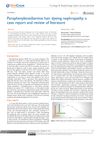 12 citations,
October 1995 in “The Journal of Clinical Endocrinology & Metabolism”
12 citations,
October 1995 in “The Journal of Clinical Endocrinology & Metabolism” Skin changes can indicate hormonal imbalances and help diagnose endocrine disorders.
 11 citations,
August 2000 in “Journal of Endocrinology”
11 citations,
August 2000 in “Journal of Endocrinology” DHEA acts like a male hormone on rat skin glands and doesn't turn into female hormones there.
 10 citations,
November 2018 in “Physiological Research”
10 citations,
November 2018 in “Physiological Research” The conclusion is that standardizing testosterone measurement methods is essential for better diagnosis accuracy in women.
 10 citations,
July 1997 in “Dermatologic Clinics”
10 citations,
July 1997 in “Dermatologic Clinics” Laser hair transplantation can be effective but should be limited to small areas and requires more training to ensure safety and effectiveness.
 9 citations,
December 2020 in “Dermatologic Therapy”
9 citations,
December 2020 in “Dermatologic Therapy” Certain drugs are effective for skin conditions like psoriasis, vitiligo, and hair loss.
 9 citations,
November 2013 in “Presse Medicale”
9 citations,
November 2013 in “Presse Medicale” The document concludes that managing female hyperandrogenism requires a combination of identifying the cause, lifestyle changes, medication, and cosmetic treatments.
 9 citations,
July 2002 in “Journal of the European Academy of Dermatology and Venereology”
9 citations,
July 2002 in “Journal of the European Academy of Dermatology and Venereology” The document concludes that fexofenadine reduces inflammation in chronic hives, cholestyramine helps half of pregnant women with itchy rashes, and relaxing incisions are a good alternative in facial surgery for the elderly.
 8 citations,
January 2013 in “BioMed Research International”
8 citations,
January 2013 in “BioMed Research International” Age, gender, and hair loss affect scalp characteristics differently in young Caucasian adults.
 8 citations,
December 2011 in “Journal of Medicinal Food”
8 citations,
December 2011 in “Journal of Medicinal Food” D-004 may be a natural alternative to finasteride for treating enlarged prostate and male baldness.
 6 citations,
November 2011 in “Journal of Dermatological Science”
6 citations,
November 2011 in “Journal of Dermatological Science” A new gene mutation may allow some piebaldism patients to regain skin color in white patches.
 5 citations,
June 2021 in “JAAD Case Reports”
5 citations,
June 2021 in “JAAD Case Reports” Platelet-rich plasma therapy may help treat folliculitis decalvans but benefits might not last without ongoing treatment.
 5 citations,
January 2021 in “Journal of Cosmetic Dermatology”
5 citations,
January 2021 in “Journal of Cosmetic Dermatology” Topical cetirizine 1% promotes hair growth in male androgenetic alopecia patients.
 5 citations,
May 2019 in “Hormone and Metabolic Research”
5 citations,
May 2019 in “Hormone and Metabolic Research” Women with nonclassic 21-hydroxylase deficiency can have successful pregnancies through IVF, with certain factors affecting their chances.
 5 citations,
January 2018 in “PubMed”
5 citations,
January 2018 in “PubMed” Biodegradable microneedle patches help topical steroids work better for prurigo nodularis.
 5 citations,
January 2018 in “Skin appendage disorders”
5 citations,
January 2018 in “Skin appendage disorders” Minoxidil base is preferred for hair loss treatment, but minoxidil sulfate may be an alternative for unresponsive patients.
 5 citations,
December 2004 in “Dermatology”
5 citations,
December 2004 in “Dermatology” Two women with very high androgen levels had only slight skin issues, one due to a non-classical adrenal disorder and the other due to an adrenal tumor.
 4 citations,
January 2018 in “Urology & Nephrology Open Access Journal”
4 citations,
January 2018 in “Urology & Nephrology Open Access Journal” Hair dye chemicals can cause serious health problems, including kidney damage.
 4 citations,
December 2017 in “American Journal of Dermatopathology”
4 citations,
December 2017 in “American Journal of Dermatopathology” Naked hair shafts are significantly associated with scarring hair loss and may help diagnose it, especially when multiple are found.
 4 citations,
January 2016 in “Acta dermatovenerologica Alpina, Pannonica et Adriatica (Tiskana izd.)”
4 citations,
January 2016 in “Acta dermatovenerologica Alpina, Pannonica et Adriatica (Tiskana izd.)” 5% minoxidil foam is a safe, effective treatment for male pattern hair loss, with increased hair count and few side effects.
 4 citations,
July 2008 in “British journal of dermatology/British journal of dermatology, Supplement”
4 citations,
July 2008 in “British journal of dermatology/British journal of dermatology, Supplement” Poor response to topical immunotherapy in alopecia areata patients is linked to impaired cell responses.
 3 citations,
August 2021 in “Cutis”
3 citations,
August 2021 in “Cutis” Some alternative medicine treatments might work for skin conditions, but their effectiveness and safety differ a lot.
 3 citations,
May 2018 in “Experimental Dermatology”
3 citations,
May 2018 in “Experimental Dermatology” Young HS patients often have other physical and mental health issues, and research on HS covers a wide range of topics including genetics, triggers, treatments, and the need for more data.
 3 citations,
May 2011 in “Journal of Obstetrics and Gynaecology”
3 citations,
May 2011 in “Journal of Obstetrics and Gynaecology” A woman's pelvic pain and bleeding led to finding and successfully treating a rare benign tumor in her reproductive system.
 3 citations,
January 2008 in “Journal of the American Academy of Dermatology”
3 citations,
January 2008 in “Journal of the American Academy of Dermatology” A patient's skin rash did not affect the area where a previous viral rash was healing, suggesting a rare immune response.
 3 citations,
August 2003 in “International Journal of Cosmetic Surgery and Aesthetic Dermatology”
3 citations,
August 2003 in “International Journal of Cosmetic Surgery and Aesthetic Dermatology” Fiber implants effectively treat permanent hair loss with over 85% success and minimal complications.
 3 citations,
October 1988 in “Clinics in Dermatology”
3 citations,
October 1988 in “Clinics in Dermatology” Using 3% topical minoxidil can help women with hair loss, but more research is needed.
 2 citations,
October 2023 in “Dermatology and therapy”
2 citations,
October 2023 in “Dermatology and therapy” Alopecia areata severely impacts quality of life, causing anxiety, depression, and work impairment.
 2 citations,
September 2023 in “Scientific reports”
2 citations,
September 2023 in “Scientific reports” The nanocomposite films with vitamins and nanoparticles are promising for fast and effective burn wound healing.
 2 citations,
May 2018 in “Journal of the American Academy of Dermatology”
2 citations,
May 2018 in “Journal of the American Academy of Dermatology” Low vitamin D might be one of several factors involved in the hair loss condition alopecia areata.
 2 citations,
February 2009 in “Clinical and Experimental Dermatology”
2 citations,
February 2009 in “Clinical and Experimental Dermatology” A man had rare skin tumors with bone formation and cholesterol deposits.






























